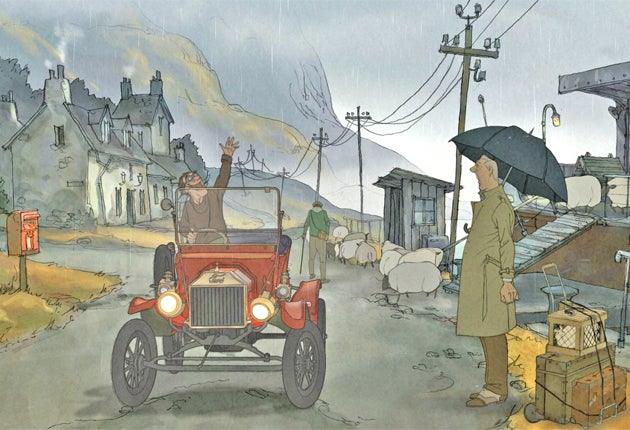The Illusionist, Edinburgh Film Festival
Magic show from the Jacques pack

Your support helps us to tell the story
From reproductive rights to climate change to Big Tech, The Independent is on the ground when the story is developing. Whether it's investigating the financials of Elon Musk's pro-Trump PAC or producing our latest documentary, 'The A Word', which shines a light on the American women fighting for reproductive rights, we know how important it is to parse out the facts from the messaging.
At such a critical moment in US history, we need reporters on the ground. Your donation allows us to keep sending journalists to speak to both sides of the story.
The Independent is trusted by Americans across the entire political spectrum. And unlike many other quality news outlets, we choose not to lock Americans out of our reporting and analysis with paywalls. We believe quality journalism should be available to everyone, paid for by those who can afford it.
Your support makes all the difference.The Illusionist could hardly find a more appropriate home than at the Edinburgh Film Festival (where last night it was opening film.) Sylvain Chomet's animated feature, based on a screenplay by Jacques Tati, is largely set in late 1950s Edinburgh.
Chomet makes wonderfully inventive use of the city's landmarks: Princes Street with the rain lashing down, the looming crag of Arthur's Seat, the front of venerable department store Jenners, the interiors of Waverley Station and all those smoky, cobbled backstreets, pubs and shops.
Chomet's pastel-coloured tribute to Edinburgh may be steeped in nostalgia but it is far from sentimental kitsch. At the time the film is set, music hall is in its dying throes. We're in a world of seedy boarding houses where performers can hardly afford to pay the rent. In one grimly funny scene, we see a clown trying to hang himself as incongruously upbeat music booms out of his record player.
The hero of the film, a Jacques Tati-like magician, is first spotted in Paris in 1959. He is growing accustomed to performing his tricks (many of which involve pulling his beloved rabbit out of a hat) in near-empty theatres or waiting, chain-smoking in the wings, for the chance to get on stage for a few moments at all. He heads to Britain to further his fortunes. In London, audiences are too preoccupied with preening, noisy R'n'B bands to pay much attention to a timid French conjuror. The magician therefore heads north. On a remote Scottish island, his ability to pluck coins from behind children's ears is better appreciated. One doe-eyed local girl is enraptured by his tricks and travels with him to Edinburgh.
Dialogue here is virtually non-existent. Chomet includes the occasional monosyllabic grunt or exclamation in French or English but there are no expository scenes in which the characters explain their motivations. This, of course, is utterly in keeping with the spirit of Jacques Tati, whose comedy was based around gesture, music and sound editing, not lengthy speechifying.
The problem is that the storytelling here verges on the oblique. There are moments in which we are not quite sure why the characters are behaving as they do.
The mood of The Illusionist is melancholic throughout. This is by no means a rip-roaring farce.
Nonetheless, there are some moments of breathtaking comic inventiveness worthy of Tati. In a well-observed set-piece, we see the magician, who has had a bit too much whisky, trying to step over the diminutive landlord of his hotel, who is forever impeding his progress on the stairs. In another, we see him wrestling with the handbrake of a car.
Chomet has clearly studied Tati in minute detail. The magician in The Illusionist has all the French comedian's old hallmarks: the stoop, the gangly athleticism and the stoical facial expression.
The Edinburgh Film Festival runs to 27 June (www.edfilmfest.org.uk)
Join our commenting forum
Join thought-provoking conversations, follow other Independent readers and see their replies
Comments